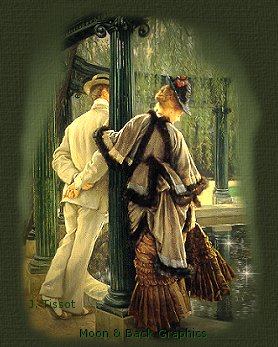|
|

|
Victorian
Courtship
|

|
The Victorians romanticized love as well
as tragedy. They revered courtship and love, despite their strict moral
code and rules of etiquette. To gatherings, young women were chaperoned,
usually by their mothers or some other married woman, to ensure nothing
'improper' occurred. Various books dictated proper etiquette; Godey's
Lady's Book and Mrs. Beeton's Book of Household Management were popular.
Balls and dances were the means by which a young girl was introduced into
Society. She was expected to stay close to her chaperone until someone
asked her to dance and was quickly returned to the chaperone after each
dance. To dance more than three times with the same partner was considered
forward and improper.
'The delight of the average hostess's
heart is the well-bred man, unspoiled by conceit, who can always be
depended upon to do his duty. He arrives in good time, fills his card
before very long, and can be asked to dance with a plain, neglected
wallflower or two without resenting it. He takes his partner duly to the
refreshment-room after each dance, if she wishes to go, and provides her
with whatever she wishes. Before leaving her, he sees her safe at her
chaperone's side.'
-Mrs. Humphry Manners for Men (1897)
Under this strict code of etiquette, the
Victorians invented new ways to play courtship. Items of apparel such as
fans, gloves, and handkerchiefs were given meaning as were objects given
as gift called 'love tokens' such as flowers, painted miniatures, or jewelry set with gemstones of particular significance.
The diamond ring which symbolizes innocence became popular as the
engagement stone during this era.
Love letters and cards allowed
expression of deep emotion which society dictated was improper to be
expressed otherwise. Valentine's Day was the day which allowed complete
written freedom. Valentines varied from paper hearts to intricate designs
of gilded lace, powdered glass, and parchment art. Books were sold
containing verse to copy into customized cards for those not poetically
inclined.
Queen Victoria and her family were
role models in Victorian society. Subsequently, the 'perfect marriage'
became the socially acceptable goal of courtship.
|

|
A Lady
Never tolerates or performs rudeness, crudeness,
indifference or ignorance from or to another human being.
Always cultivates a positive attitude.
Never chews gum in public.
Never fixes her appearance (hair or make-up) in public.
Remembers; to discuss the price of anything is never in good
taste.
Does not gossip.
Accepts and gives compliments graciously.
Never holds private conversations in public gatherings.
Never uses slang or bad language.
Always looks for ways to better herself; spiritually, physically
and intellectually.
Thinks before she speaks, once said, never forgotten.
Ladies shall never embrace and kiss when they meet in a public
place.
Has at least one reference manual regarding etiquette protocol. |
A Gentleman
A gentleman is defined as: A man of gentle birth, one entitled
to bear arms, though not noble; A man of chivalrous instinct and fine
feelings.
It is still expected that a gentleman stand up the first time
a lady enters a room or takes her final leave.
It is considered chivalrous to open a door for a lady if he happens
to be in reasonable proximity.
Should never remove his coat while standing, sitting, riding, or walking
with a lady.
Shall never ask a lady to dance if he has his coat removed.
Shall lift his hat and say Excuse Me when he brushes against a lady on the
street.
Should always walk on the outside when walking with one or more
ladies.
Shall not hold a ladies arm, except when support is needed.
Shall remove his hat while talking to a lady.
When a gentleman is seated in a restaurant and a lady acquaintance enters
and bows the gentleman should return the bow while he remains seated, if
the lady stops at his table the gentleman shall rise and remain standing till
she departs.
|


|
|
|
|
|
|
           
The
following actions were considered extremely rude in the presence
of company:
|
|
crossing the legs
adjusting your hair
winking your eyes
laughing immoderately
beating time with your feet and hands
rubbing your face or hands
shrugging up your shoulders
placing your hand upon the person with whom you are conversing
looking steadily at one
|
|
Victorian Courtship
|
|
Victorian dates
were almost always supervised in some way. A woman was never to
go anywhere alone with a gentleman without her mother's
permission.
A woman was never to go out with a gentleman late at night. In fact, it was considered extremely impolite for a
gentleman to stay late at a woman's home.
A woman was allowed some liberties, however. She could flirt
with her fan, as this behavior was within the protocol of
accepted behavior.
A single woman never addressed a gentleman without an
introduction.
A single woman never walked alone. Her chaperone was older
and preferably married.
If she had progressed to the stage of courtship in which she
walked out with a gentleman, they always walked apart. A
gentleman could offer his hand over rough spots, the only
contact he was allowed with a woman who was not his fiancée.
Proper women never rode alone in a closed carriage with a man
who wasn't a relative.
She would never call upon an unmarried gentleman at his place of
residence.
She couldn't receive a man at home if she was alone. Another
family member had to be present in the room.
A gentlewoman never looked back after anyone in the street, or
turned to stare at others at church, the opera, etc.
No impure conversations were held in front of single women.
No sexual contact was allowed before marriage. Innocence was
demanded by men from girls in his class, and most especially
from his future wife.
Intelligence was not encouraged, nor was any interest in
politics.
|
|